Every school year it seems, more and more colleges and universities show off their initiatives to help make a greener world a reality. Their focus on sustainability aligns with the concerns of students, who are increasingly anxious about the state of the environment. A Lancet study published in December 2021 surveyed 10,000 people aged 16 to 25 years old across 10 countries and found that 59 percent were very or extremely worried and 84 percent were at least moderately worried about climate change.
In the U.S., seven campuses are particularly noteworthy for working to advance the cause of sustainability. No two schools have the exact same approach; they each have differing priorities and points that they focus on. But they've all got an interest in preserving our planet's livability and protecting their students' current and future quality of life.
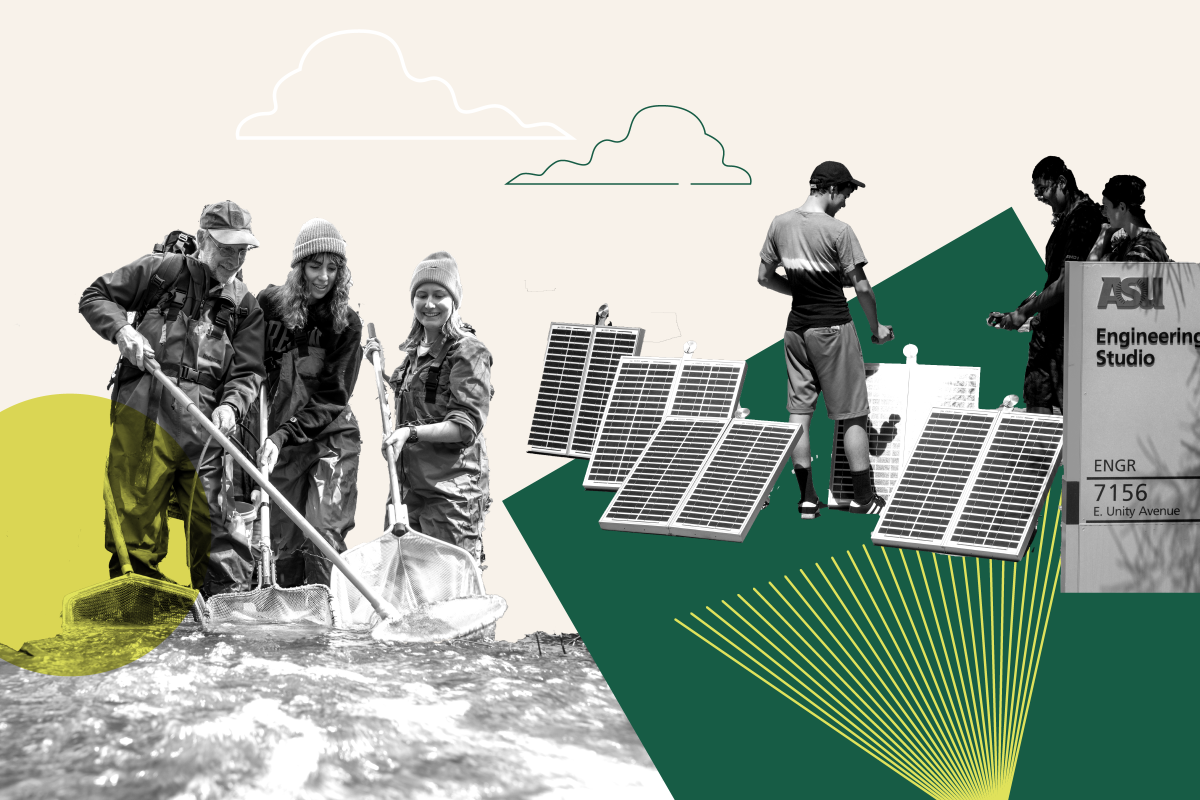
Stanford University
In the fall of 2022, after a $1.1 billion investment from venture capitalist John Doerr and his wife Ann Doerr, a philanthropist, California's Stanford University launched its first new school in 70 years: the Stanford Doerr School of Sustainability, which is dedicated to finding solutions to challenges facing planet Earth via collaboration across the university and work taking place at off-campus field sites. The university says the Doerr School includes a "three-part structure of academic departments, interdisciplinary institutes, and an accelerator for policy and technology solutions."
"We are creating a strong emphasis on what some people refer to, including me, as 'experiential learning,'" professor Lynn Hildemann, senior associate dean for education at the Doerr School, told Newsweek. "Meaning rather than just sit in the lecture and have information delivered to you, [we] engage students in problem solving, take them out on field trips, put them in the labs, so various hands-on sorts of experiences to enable them to see the connection between what they're learning and what they can do for our planet."
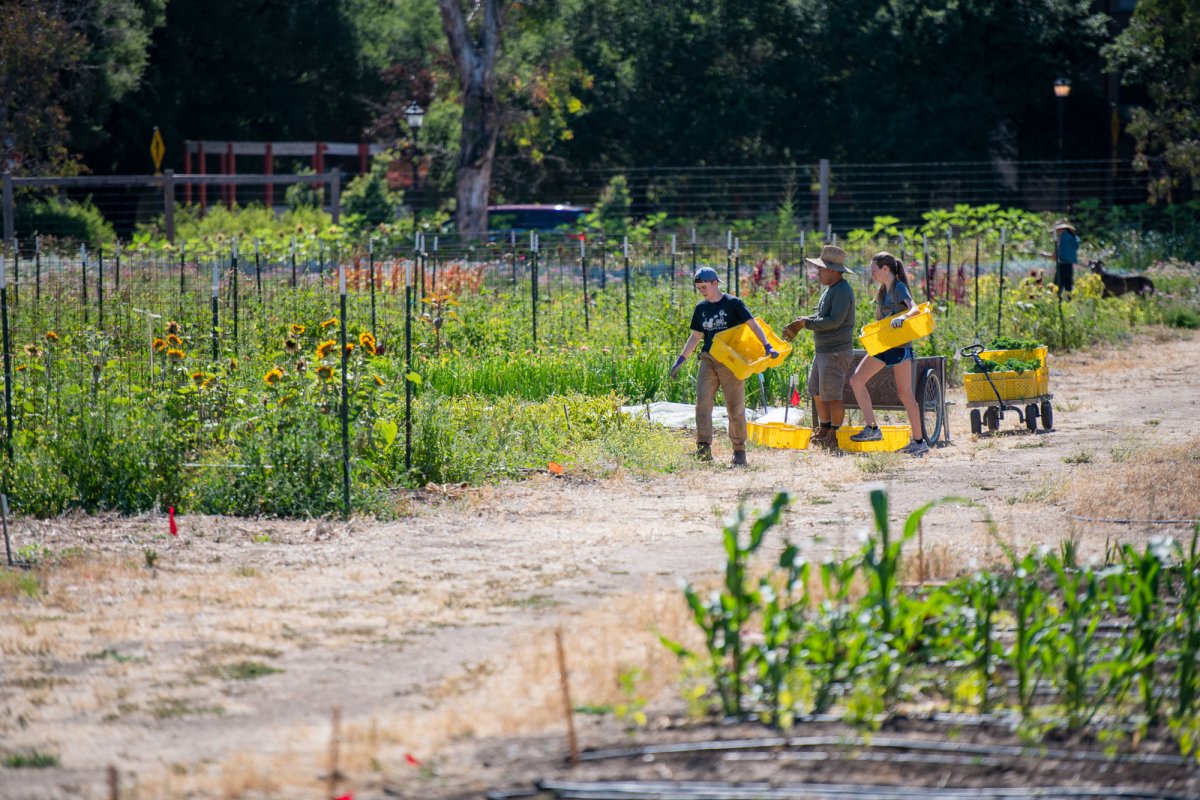
Beyond the newly opened Doerr School, which began welcoming students on September 1 of last year, Stanford prioritizes sustainability in other ways. The university has received accolades in recent years for, among other things, its on-campus recycling push and Cardinal Clean program, an inventive approach to sustainable cleaning.
Stanford describes Cardinal Clean as a "free, powerful and green cleaning standard" that works by electrifying tap water and oxygen to produce ozone, a potent and naturally occurring disinfectant, which allows the university to avoid using 5,500 gallons of other chemical cleaners per year. The substance kills 99.99 percent of germs, viruses and bacteria for 24 hours, according to the university, and it returns to regular water after seven days. In 2023, Cardinal Clean won an Outstanding Waste Prevention award from the California Resource Recovery Association.
Lincoln Bleveans, Stanford's executive director of sustainability and energy management, told Newsweek about how the school sees its sustainability-related programs as living examples that can become models for other institutions' initiatives outside the university.
"We're in a place in the world where innovation is something part of daily life, and so we try to bring all that together in a way that [makes] sustainability real—how do we create optimized solutions for Stanford but also, by doing so, create exemplars, templates that can be adapted to the rest of the world," Bleveans said.
Recycling is a central concern at Stanford. In 2021 and 2022, the school won first place in the Per Capita Category (Large Campus) from the Campus Race to Zero Waste, an annual eight-week springtime competition that began in 2001, which sees U.S. and Canadian colleges and universities receive a ranking based on their weekly recycling totals.
"There's a lot of neat technology there, but it's also a huge behavior change, where we're trying to get people not just to sort their waste appropriately but be more conscious consumers so that ultimately, over time, we hope that not only is the waste going in the right place and not to the landfill but that we can be more mindful, be more conscious producers of waste," Bleveans explained. "Hopefully that means less waste and types of waste that are easier to recycle, lower energy to recycle, or even better, will compost back into a safe natural form."
University of Oregon
Sustainability has been a focus at the University of Oregon for a while—it first established a comprehensive environmental policy in 1997 that contained "a commitment to responsible purchasing, efficient resource usage, minimizing solid and hazardous waste production, and sustainable campus planning and design."
"We have developed an expertise in developing experts in sustainable university operations," Erin Moore, a professor of architecture and environmental studies, told Newsweek. "The emerging impacts of climate change are going to continue to be a huge disruptor in higher education."
The school's Environment Initiative, which is now starting its third year, is a campus-wide effort to develop a hub "focused on higher education's role and contribution to a just and livable future." The cross-departmental fellowship program provides funding to members of the faculty for projects that contribute to leveraging environmental research and advancing social and environmental justice.
"I would say broadly the University of Oregon has really deep roots in tackling these things and to be responsive to community tribal nations, the state, the ecoregion," Moore said, adding that the university is welcoming almost 20 new faculty engaged in coursework on sustainability-related topics with plans to recruit another cohort of instructors in 2024.
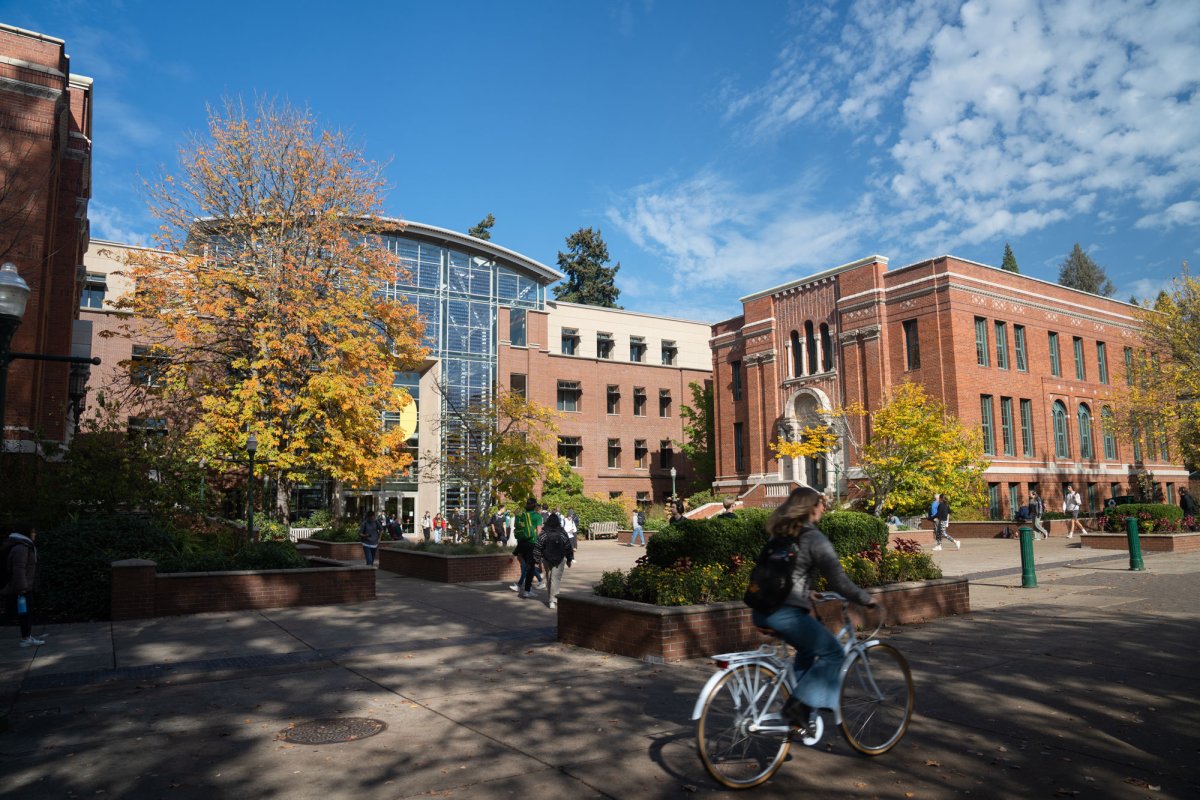
The university sees its on-campus sustainability efforts and related curriculum inside a broader context of how to address environmental concerns impacting the planet beyond its borders.
"That distinction between the guts of running a campus...whether it's recycling or energy efficiency or clean energy, the way we buy stuff, those are all really important and often provide amazing teaching and learning opportunities for students," said Joshua Skov, a senior instructor at the school. "But then...what goes on in the classroom is going to be directed toward a thousand other things going on, not just on campus or in the community but in the world."
Cornell University
New York's Cornell University touts that it is "the top-ranking Ivy League institution in national sustainability ratings." Toward that end, the university points to its platinum-level Sustainability Tracking, Assessment & Rating System status. STARS, which is part of the nonprofit Association for the Advancement of Sustainability in Higher Education, describes itself as a "transparent, self-reporting framework for colleges and universities to measure their sustainability performance." (AASHE engages with institutions "in a collaborative review and revision process prior to report publication.")
Cornell's current ranking is the fourth consecutive year that the school has achieved platinum status.
Alongside its STARS accolade, Cornell boasts that it is the eighth greenest college in the Princeton Review's Green College Honor Roll.
Sarah Carson, the director of Cornell's Campus Sustainability Office, talked to Newsweek about how a campus-wide group called the Sustainable Cornell Council has impacted the university's green focus.
"[The group] includes leadership both from the academic side and from the facility side, and we've been able to create a really fantastic partnership across the institution that we refer to as our 'living lab' so that there is leadership and accountability and ideation for how to improve operational sustainability as well as incorporating sustainability in the curriculum and in the research," Carson said. "I think you'll see, if you look at those STARS metrics, you're knocking it out of the park in terms of research and courses and things that include sustainability, and we're at the top of the pack with operational sustainability as well."
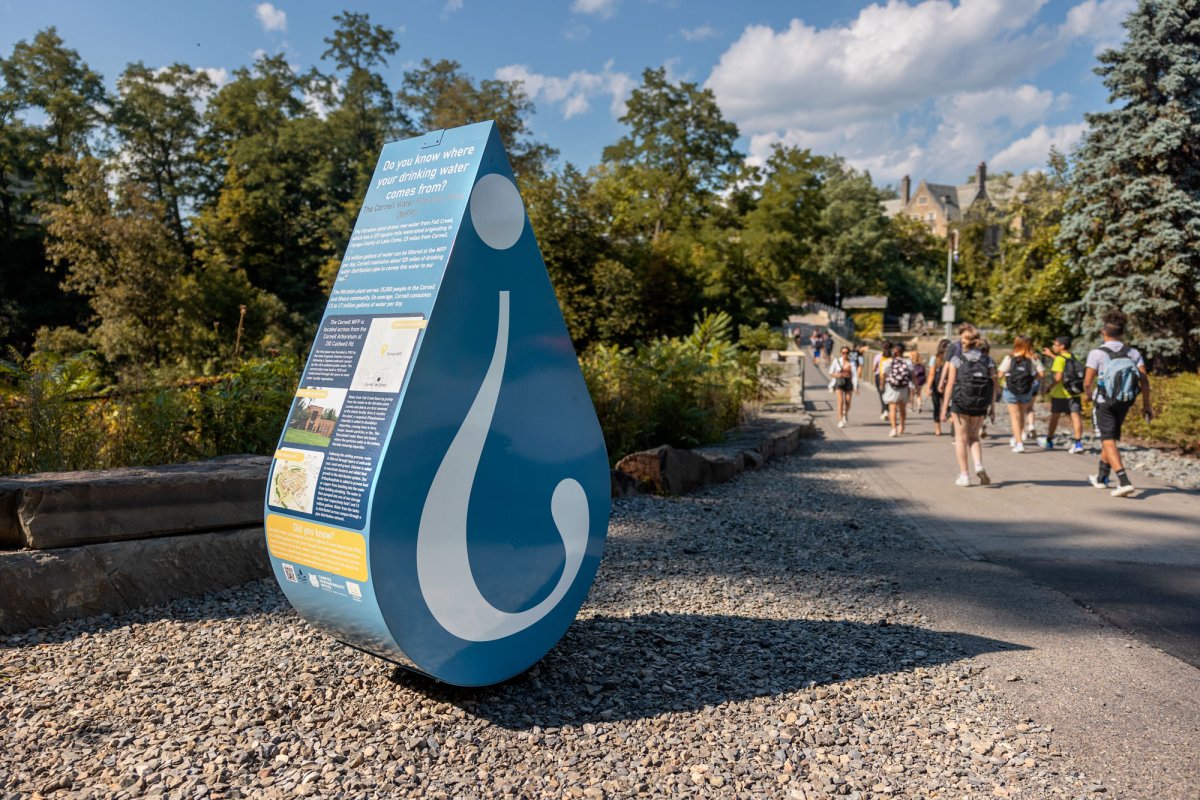
Cornell's sustainability focus is buttressed by its statistical achievements. The university points to figures showing that 91 percent of its departments are engaged in sustainability-focused research, 85 percent of students use sustainable transportation to commute to and across campus, and that the school has achieved a greater-than-50 percent reduction in carbon emissions from the 2008 baseline, which totals emission categories including university facilities, purchased electricity, faculty and staff commuting and air travel.
The school has 117 majors, minors and concentrations focused on sustainability.
"Some of the metrics about students making individual personal choices about how they are going to and from classes and to and from campus, the things that they're choosing to eat in the dining hall, show that we have [made] inroads, and we have excitement at the individual level, at the group level, as well as at the institutional level," Carson added. "Things are really starting to advance of their own accord—people are looking for ways to make their own things in their personal lives and in their personal work and school responsibilities more sustainable."
Research conducted at the school also underlines its sustainability-focused priorities.
On July 12, the Cornell Chronicle reported that Greeshma Gadikota, an associate professor of civil and environmental engineering who works on developing chemical pathways for transforming carbon in multiple sectors, will lead a $4 million project to decarbonize the concrete industry via production of low-carbon construction materials. The project, part of the White House's Clean Energy Plan, targets the concrete-production industry, as it produces 8 percent of all carbon emissions, a total that nearly quadruples that of the aviation industry.
"It's not just innovation for the sake of innovation—where you get a meal ticket so you can go to your fancy restaurant at the end of the day—it's about the planet. It's about leaving behind a legacy of clean air, clean water, healthy soil and a livable planet for the generations to come," Gadikota told Newsweek.
Dickinson College
Founded in 1783 by Benjamin Rush, a signer of the Declaration of Independence, Pennsylvania's Dickinson College was the first college established after the formation of the United States. The institution says that its Environmental Studies & Environmental Science Department is "one of the oldest and best established in the country."
The school, which says that it became carbon neutral in 2020, has numerous on-campus sustainability projects that speak to its focus on all things green.
Students can elect to live in the Center for Sustainable Living, also called The Treehouse—a building that is Pennsylvania's first LEED-Gold (Leadership in Energy and Environmental Design, a green rating system) college residence hall. The Center for Sustainability Education's Handlebar Bicycle Co-op provides members of the Dickinson community with a workspace, tools, parts and assistance for their bikes.
"What we're doing on biking is trying to communicate to students that this is not just about recreation and fun, this is actually a mode of transportation—you can use this for commuting, you can use this for running errands and whatnot," Neil Leary, the director of Dickinson's Center for Sustainability Education, told Newsweek. "A bike can really be a very sustainable way to get around and do virtually everything you need to do."
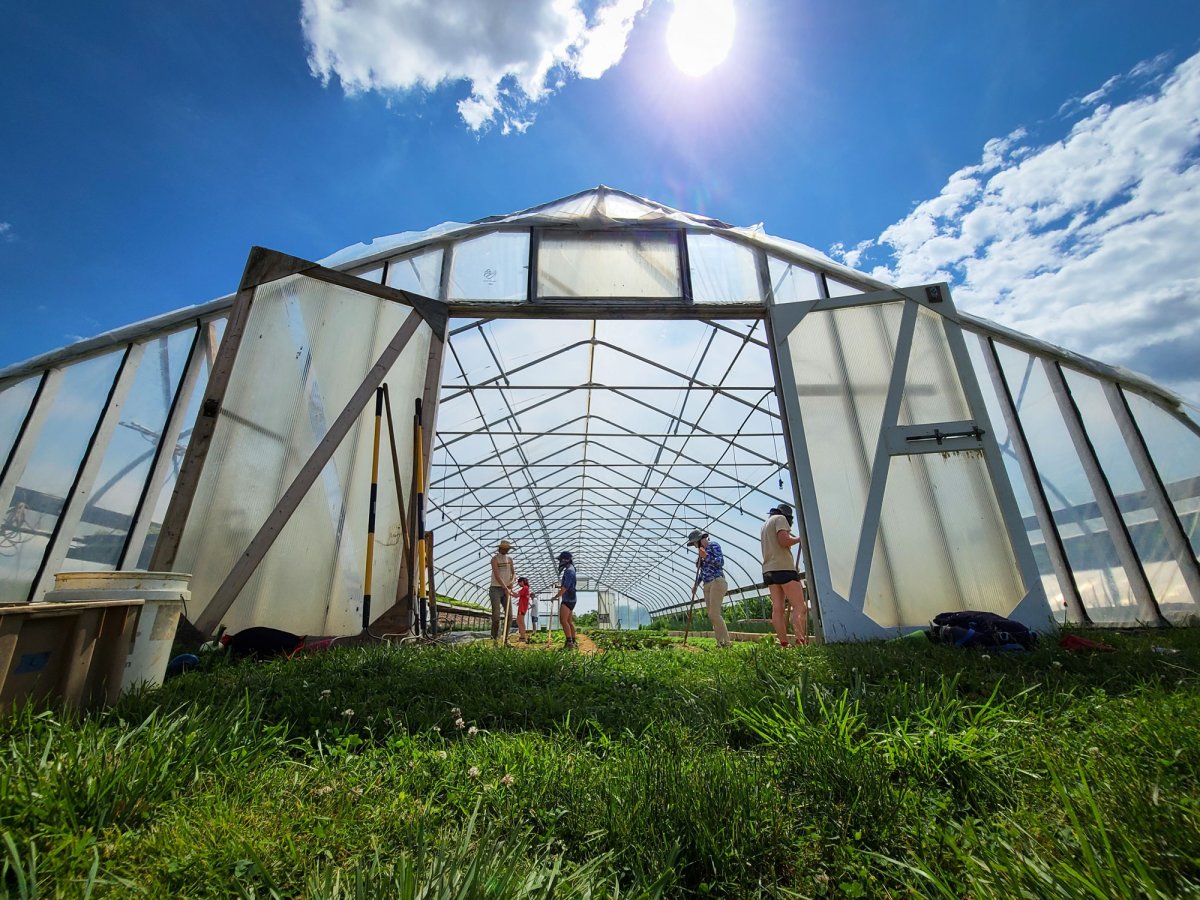
In February, Dickinson signed the Climate Leadership Resilience Commitment from the Second Nature nonprofit, a group that aims to accelerate climate action in, and through, higher education by mobilizing educational institutions to act on climate commitments, scale campus climate initiatives and innovate climate solutions. The Resilience Commitment that Dickinson signed aims to limit the impacts and lessen the hardships on communities most at risk because of climate change.
"The faculty passed a resolution last fall asking Dickinson to become part of this initiative with Second Nature, but students are very much involved in the actual implementation and work," Leary explained. "Dickinson College is going to work with Cumberland County in Pennsylvania and also the borough of Carlisle [where the school is located] on learning how people in our region are at risk from climate change and what can we do to adapt, build resilience, be less at risk of harmful effects from climate change."
In June, the Dickinson College Farm received a $20,000 grant for the construction of an anaerobic digester that will turn food waste and manure into energy. The farm, which will help divert animal waste from a nearby water source with the new equipment, has received more than $1.5 million for the digester, with earlier funding coming from multiple sources, including the USDA Natural Resource Conservation Service, the U.S. Environmental Protection Agency and the Pennsylvania Department of Agriculture.
Leary said the anaerobic digester "will be an important demonstration that this can be done in a feasible way that other farmers can adopt," adding that the school is "helping solve what to do with food waste from the public schools and local grocery stores."
"All the stuff that we're talking about at Dickinson—we don't do this to be green, we do this because we think this is a necessary, essential part of the education of our students," Leary said. "Whatever our students come to study at Dickinson, and whatever they see themselves doing in the future, sustainability is going to be part of their education."
College of the Atlantic
Reaching No. 1 on the Princeton Review's green college list every year since 2016, Maine's College of the Atlantic says it will keep its total size capped at 350 students "to maintain the closeness of our small community." All students design their own major in human ecology at the school, which does not have academic departments and was the first in the U.S. to become carbon neutral, a feat it accomplished in 2007.
"Being small has its disadvantages as a college, in terms of economies of scale," College of the Atlantic President Darron Collins told Newsweek, "but it's also absolutely crucial to the pedagogy of the whole place. This is a community of very, very serious and inspired teachers and learners, and the thing that unites all of us together is a commitment to a better ecological future."
College of the Atlantic says on its "Sustainability in the Curriculum" webpage that human ecology "is all about our relationships with the planet's natural, social, and built environment." The school aims to eliminate its fossil fuel use by 2030 and to reduce energy consumption in COA-owned buildings by 20 percent from baseline data, which is an average of consumption levels from 2010 to 2013. It plans to stop purchasing fossil fuel-powered vehicles by 2025.
Also by 2025, the school, which maintains two farms to provide food for students, plans to eliminate campus and campus food vendor procurement of all "non-essential, non-compostable, single-use disposable plastics."
"There's been something of what I call 'a green arms race' on campuses, like who can make the biggest solar panel farm or who has the most solar panels on how many roofs, and that's fantastic, that's a good thing," Collins said. "Where we stand out is in how we involve all of our students in the production, decision-making and building of that ecological infrastructure...we should measure our effectiveness not in the amount of kilowatt hours we produce but how many students come away from their experience here ready to make change in the world."
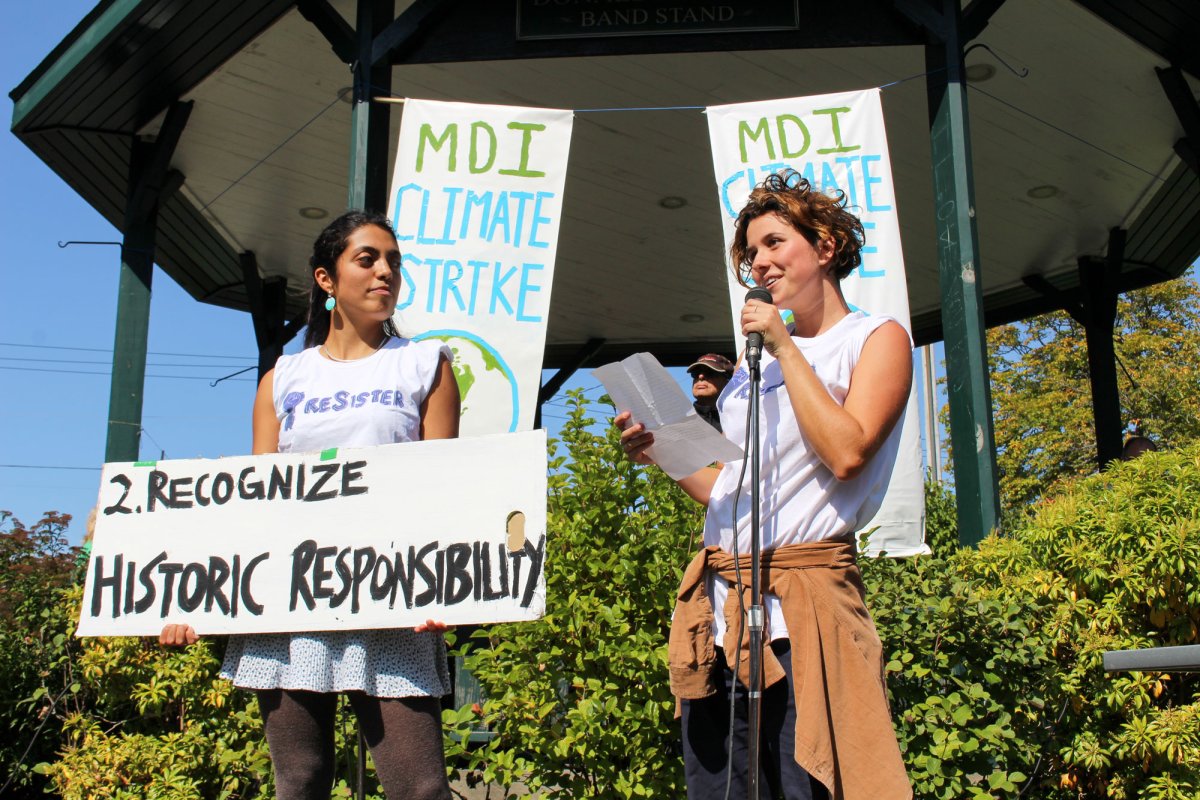
The student-led Campus Committee for Sustainability meets weekly to discuss on-campus sustainability projects. The school's Zero Waste Club also meets weekly to address improvements in waste reduction. Waste, an important on-campus focus, is subjected to a yearly "waste audit" by students and staff at the school in order to compare yearly totals and to monitor improvements in reducing trash totals.
The College of the Atlantic Sustainable Investment Group, which is composed of students, faculty and staff, oversees a small part of the institution's endowment. According to the school, the group is responsible for making "socially and ecologically conscious investment decisions for this fund."
"In 2013, we were one of the first institutions to divest our endowment from fossil fuel investments," Collins explained, adding that the move was "a cat's whiskers approach to ecology and the environment. At the time, this was a student-led initiative brought to the board of trustees of the College of the Atlantic by students, argued by students and eventually passed by our investment committee."
University of Colorado Boulder
The University of Colorado Boulder has a strong history of sustainability-focused accomplishments. It touts that it was the first university to establish a recycling program and the first to achieve a gold STARS ranking.
On campus, it maintains 33 LEED projects, a total of 40 active student groups involved in sustainability and 474 courses related to sustainability. The school achieved a waste diversion rate of about 52 percent in 2019, a number that then dropped slightly to about 48 percent due to the COVID pandemic. The campus is working toward a zero-waste goal by 2025.
"I think the secret to the university's success has been the coalition that the students, faculty and staff have woven over the last 53 years since the Environmental Center was started on Earth Day of 1970," Dave Newport, director of the CU Environmental Center, told Newsweek. "[The center] is actually older than the EPA, and so we've been doing this for a while."
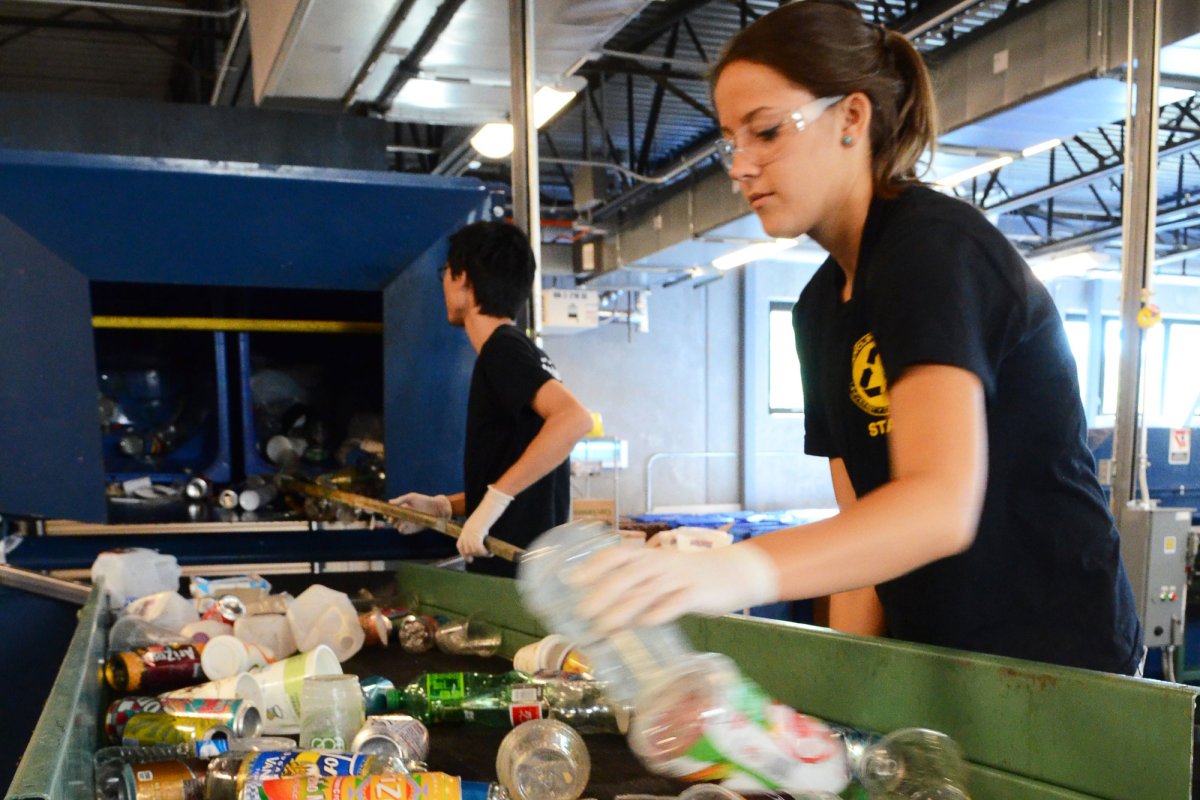
The CU Environmental Center has programs on zero waste, sustainable transportation and sports sustainability. The center's contributions to the campus include over 1,500 volunteer hours each year, with activities including an effort to help achieve zero waste at football and basketball games, participation in recycling-related events and assistance with student move-in and move-out. The center also hosts more than 25 educational events per year and has about 160 student employees.
When Newport started at CU in 2006, he said the student environmental leadership was primarily graduate students, but that has changed in recent years.
"The leadership now is from freshmen...it's amazing. Freshmen walk in, schooled on many of the concerns that they have and certainly concerned about the world as it is and what they're going to face for their lives," he said. "So, we're seeing a broader base of students that are more energized and more educated about this and more dedicated, so they are leaning in hard."
The school's Energy and Climate Justice Program aims to provide a deeper understanding of "how our energy and water use directly relates to climate change and social justice issues...and what we can do about it," according to its webpage. Under the program's umbrella, students can do things like participate in a sustainability innovation micro-credential for which they are issued a digital badge that allows achievements to be displayed and shared; join the Climate Justice Team, a project that addresses the reality that pollution often unjustly burdens underprivileged communities; or help CU's Green Greeks in their push to reduce Greek organizations' environmental impact.
"My belief is that if this upcoming generation doesn't get rowdy, we're not going to do what's needed to adequately address human contribution to climate change," Heidi VanGenderen, chief sustainability officer for CU Boulder, told Newsweek. "[This campus] is in a place of extreme natural beauty, which draws a lot of people here, but it's actually an important reason that we are striving to be as sustainable as we can."
Arizona State University
On June 1, Arizona State reported that the Times Higher Education Impact Rankings, which measure universities' progress in achieving United Nations Sustainable Development Goals, ranked ASU as No. 1 in the U.S. and No. 6 worldwide. Progress is tracked by the U.N. High-Level Political Forum on Sustainable Development, a group that is a subsidiary of the U.N. General Assembly and Economic and Social Council. The rankings measure universities' commitment and action toward goals like clean water and sanitation, affordable and clean energy, and sustainable cities and communities.
It is the fourth consecutive year that ASU has been named No. 1 in the U.S.
In April, the STARS program named ASU No. 1 in the U.S. and No. 2 in the world for its sustainability practices. Reporting the high ranking, the university listed its noteworthy eco-friendly characteristics, including using solar panels to power operations, building structures with built-in strategies to decrease carbon emissions and encouraging university groups to harvest campus-grown produce.
"To fully integrate sustainability into any organization or institution, it needs to start at the top, and there is a complete and total commitment from ASU President Dr. Michael Crow to sustainability, and there has been for nearly two decades now since about 2006, when ASU was the first higher education institution in the U.S. to establish a school of sustainability," Marc Campbell, ASU's executive director of university sustainability practices, told Newsweek. "Where we are now is not an endpoint. We are on a journey, as every organization is, to continue to get better, and so we'll continue to evolve our strategy to really get to more physical carbon emissions reductions on campus."
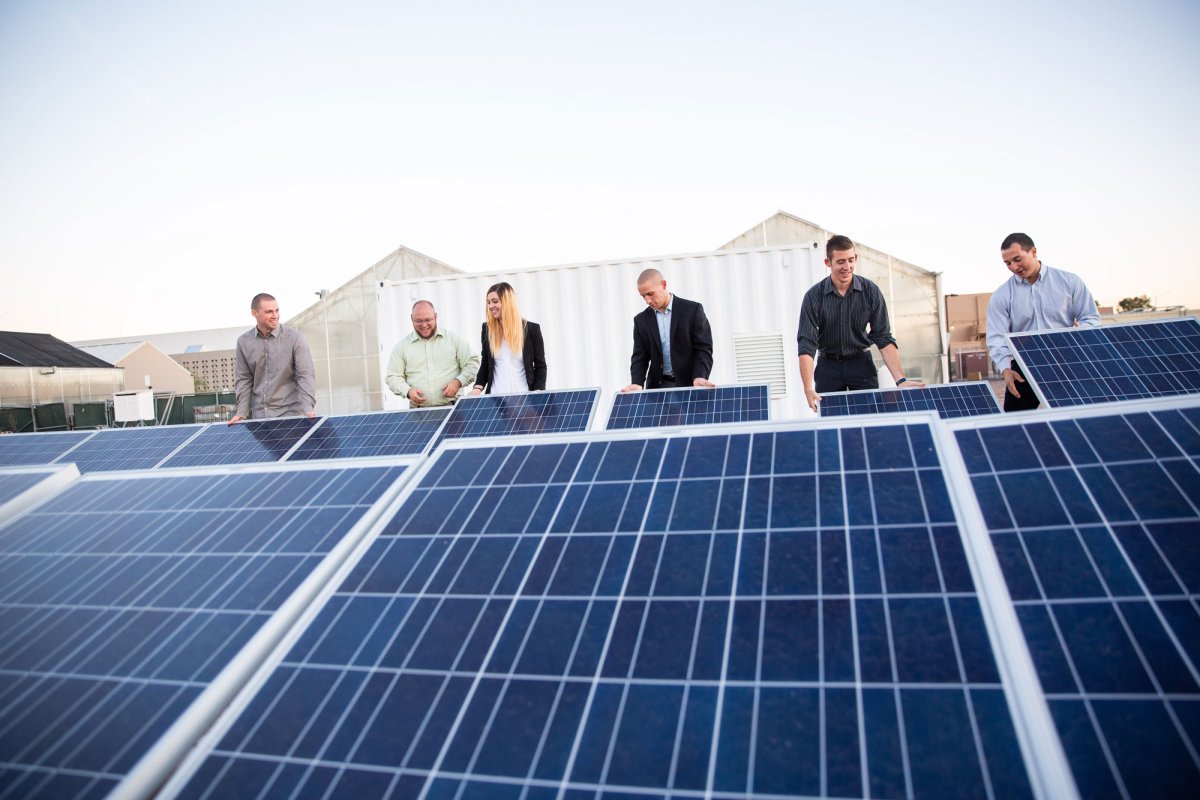
In 2007, ASU set out a goal to reach zero greenhouse gas emissions by 2025. The university, though, accomplished its goal earlier than expected, on June 30, 2019. At that time, Crow said that a university goal was to make "sustainability innovation and leadership a hallmark of Arizona State University."
Crow's words have proven actionable. The school's Global Institute of Sustainability and Innovation lists on its website ways that ASU has moved to increase greener practices, including making infrastructure upgrades to reduce energy consumption, using chilled water for cooling and providing an interactive web tool called the Campus Metabolism "that enables users to examine real-time energy and water use on campus."
"When it comes to sustainability, we need to be transparent about how we're doing. I think it's great that we have a lot of accolades...but what transparency does is it helps you to have more engagement with your community, particularly with the students, so people can ask questions, but they can also challenge us," Campbell explained. "They can actually go and see live information and ask us questions that keep us sharp, and that's the point to me—that we need to be open about how we're doing and where we can improve and having information out publicly does both of those things."
About the writer
To read how Newsweek uses AI as a newsroom tool, Click here.





